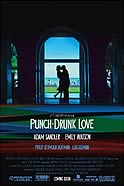 Punch-Drunk Love is a quirky and unpredictable bittersweet romance in which Adam Sandler manages to shake off his previous comedic typecast and establish himself as a credible actor. Punch-Drunk Love is a quirky and unpredictable bittersweet romance in which Adam Sandler manages to shake off his previous comedic typecast and establish himself as a credible actor.
Barry Egan's (Adam Sandler) world ricochets between his novelty plumbing supplies warehouse, his seven officious sisters, a bunch of swindling sex-line goons, and a somewhat obsessive collection of chocolate deserts. Add to this mix his habitual inability to deal with stress, random fits of psychotic rage and a complete incapacity to cope with life's regular unpredictability. Finally add a sexy, well adjusted, successful woman, an inexplicable car crash and a few psychedelic interludes. Shake well. The resulting cocktail is fascinating, often amusing and occasionally moving but ultimately falls short of so much that it promises to be, and could have been.
Anderson is no stranger to making films which blend tragedy and humor in an unsettling and provocative way. In both Boogie Nights and Magnolia, he received wide critical acclaim for creating complex and engaging characters who simmer with energy and fluctuate between a fantasy world and slap-in-the-face reality.
In Punch-Drunk Love, the central character is a little more accessible, containing many of the familiar eccentricities of Sandler's past roles. This time however, Sandler manages to generate enough depth, intensity and interest in this character to carry us through most of the film by placing a genuinely insecure, vulnerable man in the shoes of this recognizable slapstick caricature.
The trouble is however, that the film's structure appears to closely mirror Barry Egan's life, in the sense that some things seem to happen for no apparent reason, or are given no satisfactory explanation or conclusion, leaving the audience identifying with the central character, and yet in a state of mild confusion for much of the time. Anderson runs several, intertwining threads through the film, and although each is interesting in its own right, none are ever really given a decent chance to develop, except the romance itself.
Emily Watson pulls off a superb performance as the sassy chick with an inexplicable crush on Barry, and a resolute desire to pursue him. But despite delivering every line with elegant style, her character is simply not given the scope to develop fully enough to ever really explain or justify her apparent immediate attraction to Barry. This may be intentional, as it enables us to empathise with Barry's complete shock at her startling infatuation and subsequent inability to know how to handle this situation. It does mean however that much of the romantic tension relies on the impending sense of looming disaster which lingers uncomfortably around all of Barry's misadventures, and not on the interplay between the two characters themselves. Provided Barry doesn't screw up, he seems to have it made - do I sense echo's of Sandler's Happy Gilmore? - and it's that uncertainty which keeps us interested, if a little bemused for most of the film. Overall the pace of the film stops and starts, offering brief insights into Barry Egan's world and rare moments of complete clarity, but never fully delivering any one story as satisfyingly as it might have. The romance is baffling yet charming, and contains enough chemistry to carry the film, perhaps deserving more screen time as it is the least probable of all Barry's escapades, and contains the greatest interest and dramatic potential.
Certainly an imaginative and original film, despite it's many idiosyncrasies. Not Anderson's best, but an interesting new approach from a highly creative director. Well worth a look. :: Tom West |
 Punch-Drunk Love is a quirky and unpredictable bittersweet romance in which Adam Sandler manages to shake off his previous comedic typecast and establish himself as a credible actor.
Punch-Drunk Love is a quirky and unpredictable bittersweet romance in which Adam Sandler manages to shake off his previous comedic typecast and establish himself as a credible actor.